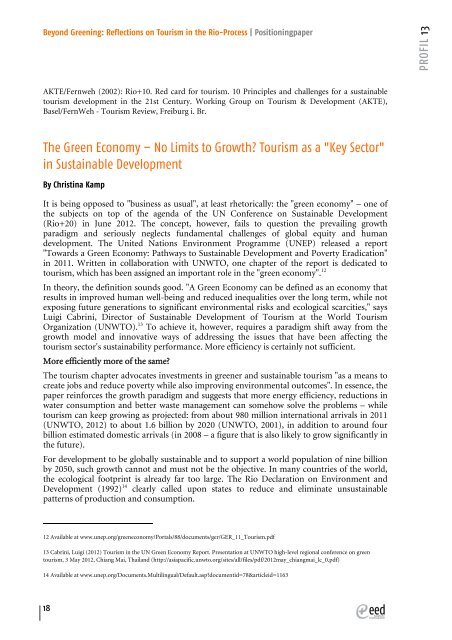Beyond Greening - Tourism Watch
Beyond Greening - Tourism Watch
Beyond Greening - Tourism Watch
Create successful ePaper yourself
Turn your PDF publications into a flip-book with our unique Google optimized e-Paper software.
<strong>Beyond</strong> <strong>Greening</strong>: Reflections on <strong>Tourism</strong> in the Rio-Process | PositioningpaperAKTE/Fernweh (2002): Rio+10. Red card for tourism. 10 Principles and challenges for a sustainabletourism development in the 21st Century. Working Group on <strong>Tourism</strong> & Development (AKTE),Basel/FernWeh - <strong>Tourism</strong> Review, Freiburg i. Br.The Green Economy – No Limits to Growth? <strong>Tourism</strong> as a "Key Sector"in Sustainable DevelopmentBy Christina KampIt is being opposed to "business as usual", at least rhetorically: the "green economy" – one ofthe subjects on top of the agenda of the UN Conference on Sustainable Development(Rio+20) in June 2012. The concept, however, fails to question the prevailing growthparadigm and seriously neglects fundamental challenges of global equity and humandevelopment. The United Nations Environment Programme (UNEP) released a report"Towards a Green Economy: Pathways to Sustainable Development and Poverty Eradication"in 2011. Written in collaboration with UNWTO, one chapter of the report is dedicated totourism, which has been assigned an important role in the "green economy". 12In theory, the definition sounds good. "A Green Economy can be defined as an economy thatresults in improved human well-being and reduced inequalities over the long term, while notexposing future generations to significant environmental risks and ecological scarcities," saysLuigi Cabrini, Director of Sustainable Development of <strong>Tourism</strong> at the World <strong>Tourism</strong>Organization (UNWTO). 13 To achieve it, however, requires a paradigm shift away from thegrowth model and innovative ways of addressing the issues that have been affecting thetourism sector's sustainability performance. More efficiency is certainly not sufficient.More efficiently more of the same?The tourism chapter advocates investments in greener and sustainable tourism "as a means tocreate jobs and reduce poverty while also improving environmental outcomes". In essence, thepaper reinforces the growth paradigm and suggests that more energy efficiency, reductions inwater consumption and better waste management can somehow solve the problems – whiletourism can keep growing as projected: from about 980 million international arrivals in 2011(UNWTO, 2012) to about 1.6 billion by 2020 (UNWTO, 2001), in addition to around fourbillion estimated domestic arrivals (in 2008 – a figure that is also likely to grow significantly inthe future).For development to be globally sustainable and to support a world population of nine billionby 2050, such growth cannot and must not be the objective. In many countries of the world,the ecological footprint is already far too large. The Rio Declaration on Environment andDevelopment (1992) 14 clearly called upon states to reduce and eliminate unsustainablepatterns of production and consumption.12 Available at www.unep.org/greeneconomy/Portals/88/documents/ger/GER_11_<strong>Tourism</strong>.pdf13 Cabrini, Luigi (2012) <strong>Tourism</strong> in the UN Green Economy Report. Presentation at UNWTO high-level regional conference on greentourism, 3 May 2012, Chiang Mai, Thailand (http://asiapacific.unwto.org/sites/all/files/pdf/2012may_chiangmai_lc_0.pdf)14 Available at www.unep.org/Documents.Multilingual/Default.asp?documentid=78&articleid=116318












